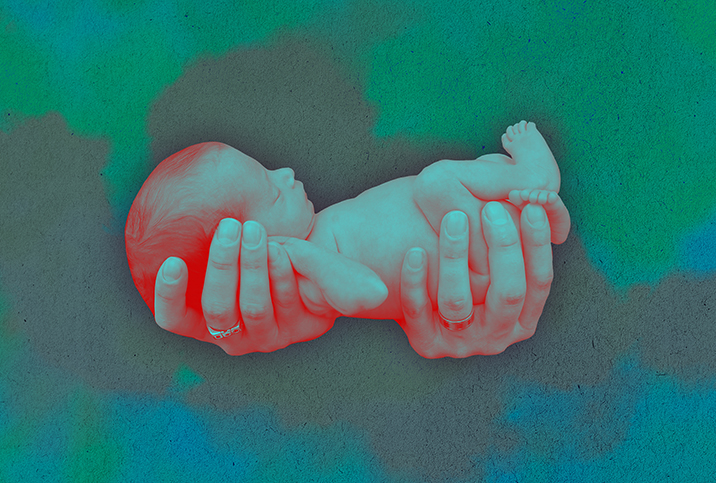How to Redefine the 'Fourth Trimester' for Parents in the NICU

I have this memory of rising from bed to the sound of my infant daughter crying. I lean over in our dark bedroom and scoop her out of the bassinet, then bring her to my breast to feed. I can almost feel the heaviness in my eyes and arms, the disorienting mixture of sleep deprivation and joy, when I conjure this moment.
But it's a false memory forged by stories and advice from friends, articles and social media posts; it was not my reality. Instead, for three months following my daughter's birth—a period known as the fourth trimester—I slept in a quiet bedroom and woke to my alarm clock telling me it was time to pump.
Meanwhile, she was asleep—or crying out, a thought that still pulls a rock up my throat—in the neonatal intensive care unit (NICU).
What is the fourth trimester?
The three months following birth are sometimes called the fourth trimester, a term first coined by Harvey Karp, M.D., a pediatrician and the author of "The Happiest Baby on the Block." Karp's definition of the fourth trimester focuses on making a comfortable environment for the baby, who "would definitely have voted for a few extra months inside the womb."
To help babies cope with this abrupt transition from womb to world, Karp encourages parents to recreate the womb as much as possible through lots of swaddling, swaying and cuddling.
For parents, the fourth trimester is a time of abrupt transition, physically and emotionally. Those early weeks are a time of exhaustion; postpartum care; and a chaotic loop of crying, feeding, dirty diaper and never enough sleep. Everyone is learning to adjust to life during the first 12 weeks.
You'll never be fully prepared for the mood swings, baby blues and uncertain sleep schedule during the first few months of your baby's life.
NICU and the fourth trimester
The NICU is a reality no one wants to prepare for—and most of us assume we don't need to. If your baby requires NICU care, you're suddenly (often indefinitely) surrounded by strangers who are all there to help your baby survive and thrive. Inevitably, they create a barrier between you and your baby.
The advice that newborns should be made to feel like they're still in the womb can be a painful reminder of everything we can't do with our baby in the NICU. When babies are born too early or with medical complications (my daughter was both), they often can't be held or can only be held with the help of nurses.
The truth is, every fourth trimester looks different, but NICU parents face some extra complicated challenges. For me, the fourth trimester became a regular exercise in taking care of myself and my family amid trauma and frustration, adjusting expectations and finding some beauty in our unique journey.
It is typical (although maybe not a good thing) for attention to shift dramatically from the mom's health to the baby's health after birth. For NICU parents, that shift is even more pronounced. A baby might be fighting for their life in those early days, making it nearly impossible to address your own.
You still have to try.
Heartache of a NICU parent
"Postpartum is generally a bit traumatizing for parents," said Erin Schlozman, M.A., L.P.C., a counselor in Kansas City, Missouri, and a former NICU mom. "When there are medical complications, it's that much harder."
That's why it's so important to pay attention to your own health and well-being.
Those first few days, ask the questions about your own comfort, Shlozman said, including things like where can you fill up your water bottle, if you can you bring food into the NICU, and who can offer you support and answer questions about pumping or breastfeeding.
When I got enough sleep, ate regular meals and gave myself plenty of breaks from sitting at my bedside, I had a clearer head and the energy to absorb information from doctors and understand what was going on. Taking care of myself allowed me to take care of her.
Karp describes the "five S's" that keep babies comfortable in the fourth trimester:
- Snug wrapping or swaddling
- Shushing
- Swaying motion
- Side or stomach position holding
- Sucking opportunities
"They will make your baby feel back at home and trigger her calming reflex."
'Home,' in this sense, is as close to mom as possible.
The importance of swaddling
After my daughter's first surgery, we couldn't hold her for several days. The idea that she wanted to be held during that time was heartbreaking. That's where the physical and occupational therapists in the NICU come in.
Physical and occupational therapists in the NICU are trained to understand how hard this is for parents, according to Sue Ludwig, C.N.T., a registered and licensed occupational therapist and the president and founder of the National Association of Neonatal Therapists in Cincinnati. They're also experts in helping you identify safe kinds of physical contact.
"We want to make sure you are connected with your baby," Ludwig said.
Ludwig emphasized that a newborn baby's system does expect certain things, such as the feeling of being snug and secure. NICU staff are trained to mimic those expectations through swaddling, hand containment, physical therapy and infant massage.
So even if you can't hold your baby, those needs can be met in different ways. It helped me to know that my daughter was comforted simply by my presence, even though I couldn't hold her as closely and freely as I wanted to.
"They know your smell," Ludwig said. "They were swimming in your amniotic fluid—all of it smells like your diet. They know you."
The reality of NICU parenting
When I could finally hold my daughter, it was the best feeling in the world. It remained challenging, navigating all of the tubes and wires attached to her body.
The fourth trimester was nothing like what I expected. My partner and I did not pace our house at night while feeding, rocking and trying to get her to sleep. Our home was quiet and empty, but our lives were still somehow filling up with self-defining moments and lifelong lessons.
The fourth trimester was a time of discovering all new kinds of hardships and how to get through them. The fourth trimester was our time to learn what it means to be parents—as it is for everyone stepping into this role—so much of which is simply being there for your child and showing them they're loved however you can.
If you are reeling while adjusting to life as a new parent and need a therapist but don't have one, try Giddy Telehealth. The easy-to-use online portal gives you access to hundreds of healthcare professionals. Many of them offer same-day appointments and video consultations.


















